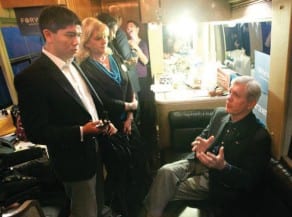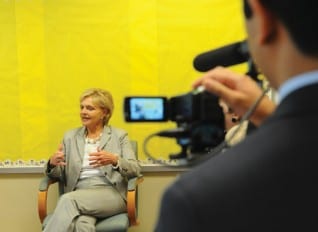At only 29 years old, Firoz Jameel (‘09) is already a seasoned political operative.
Since his freshmen year at CA, Jameel has worked every election cycle, save one. It has been a fifteen-year journey that has taken him from municipal politics to the North Carolina governor’s mansion, the White House, and back again.
His experience has encompassed myriad political roles—from grassroots volunteer to community organizer, campaign operative to paid political consultant, even to the part of personal aide for a prominent politician during a high-profile campaign, and numerous others in-between. Altogether, it is an arc that has afforded him an insider’s view into the many dimensions of electoral politics.
Jameel—who graduated from Duke University with degrees in economics and public policy before earning his Master of Business Administration from the University of North Carolina in 2019—has been following the call to civic engagement for almost as long as he can remember.
“I was politically engaged at an early age,” says Jameel. “I would follow stories covered in the Raleigh News & Observer. I was always fascinated to see how they would unfold.”
A foray into Cary’s municipal politics in ninth grade—delivering a speech to the Cary Town Council in successful opposition to the construction of a large hotel in his neighborhood—proved formative, sparking an initial interest in grassroots politics.
“It was that moment, almost accidentally, that I realized that those involved in decision-making processes are those that are in the room. It was those that showed up, those that made their voices heard.”
THE ART OF PERSUASION
At CA, he discovered an opportunity to do just that—make his voice heard—throwing himself into CA’s Speech and Debate program. It is an experience that Jameel credits—alongside an opportunity to work the 2008 Iowa caucuses with two CA classmates—for fanning that initial spark of political interest into a full flame.
Jameel’s specialty was extemporaneous speaking, an event where speakers are expected to prepare a seven-minute speech on a current events topic with only 30 minutes to prepare. A broad knowledge base and the ability to think your feet under pressure were crucial.
“Debate gave me important insights into how political issues are framed for the public. It made me realize that, for all issues, there are always going to be two sides. It taught me how to analyze both—and to effectively understand and argue, not only the side I agree with but the one that I don’t,” explains Jameel. “I learned how to empathize with people that might not share my opinion, and to craft persuasive arguments that appeal to different constituencies with different beliefs.”
The lessons imparted by the Speech and Debate program were not limited to argumentation, policy, and persuasion, however. “My debate coach, Carole Hamilton, instilled in me that it is always worth doing the right thing, even if it is hard to do,” reflects Jameel. “And RJ Pellicciotta taught me not to be intimidated by things that may seem bigger than me— that I have the tools to tackle them.”
INTO THE FRAY
He got his first opportunity to put those tools to good professional use as an undergraduate at Duke University, securing an internship in the communications office of North Carolina Governor Beverly Purdue. He was responsible for social media and video production—a role he landed, in part, because of expertise gained at CA.
“I had taken video production at CA for my art credit,” explains Jameel. “I knew how to communicate a message, how to elevate the production value of the digital assets we were creating, even better ways to light the governor. She was so pleased with my work that she helped me apply for a White House internship.”
He laughs, “Let that be a lesson: that random elective you take in high school may just be the key to advancing your career.”
And advance it, it did—first to that internship in the Office of Intergovernmental
Affairs in President Barack Obama’s White House (an experience he sums up as
“awesome”), and later to a high-profile role within Lieutenant Governor of North Carolina Walter Dalton’s gubernatorial campaign.
“WE HAVE TO ENSURE THAT WE ARE CREATING A SOCIETY WHERE ALL PEOPLE ARE EMPOWERED TO BE CIVICALLY ENGAGED, REGARDLESS OF THEIR RESOURCES OR BACKGROUNDS.”
As Dalton’s “body man,” Jameel was his right-hand personal aide, accompanying him on the campaign trail and assisting with all facets of his day-to day-campaign. “Being at the side of the Lieutenant Governor all those months gave me a much deeper understanding of the political process and everything that is required to be a politician—including the stress involved.”
After Dalton’s loss in the 2012 gubernatorial campaign, Jameel turned to the private sector for a needed respite from the stress of professional politics. The call of civic responsibility would prove too strong, however, and, in 2016, he found himself returning to the political arena.
“At that time, the image of North Carolina that was being presented by our elected policymakers did not align with the state that I knew,” says Jameel. “I wanted to make a difference —to restore my state’s reputation to the welcoming, inclusive, open North Carolina that got my parents to move here in the 1980s.”
Jameel threw his political acumen and gift for persuasive rhetoric into political consulting, creating outreach strategies to drive fundraising for candidates aligned with this vision of North Carolina. The work proved both rewarding—and revealing.
“Aside from making an impact, I realized what appealed to me most was figuring out how best to appeal to voters—determining what messages would ultimately sway their decisions to vote for my candidate. It made me realize that I wanted to pursue marketing.”
Jameel earned his Master of Business Administration from UNC in 2019. These days, he leverages his passion for persuasion as a brand manager in the private sector, designing campaigns to win over consumers to his product lines.
GETTING IN THE ROOM
While he has hung up his professional political career (for now), he remains committed to civic engagement through active volunteerism. With age and experience has come a deeper, more nuanced understanding of issues that confront our political processes—of the challenges of “getting people into the room” where the decisions are made—including challenges of inclusivity, equity, and privilege.
“As I’ve gotten older, I realize we need to ask questions about who knows the room exists and who can access it,” offers Jameel. “We need more voices to be heard. And we have to ensure that we are creating a society where all people are empowered to be civically engaged, regardless of their resources or backgrounds.”
Ensuring that everyone can “get in the room” has been in sharp focus for Jameel this year. And it’s why he committed himself to turn out the vote, serving as an election judge at precinct 404 in Forsyth County, North Carolina. Working alongside his fellow judge and chief judge, he ensured that the 2020 election was run fairly, freely, and to the letter of the law.
“I read articles about the need for poll workers, about how the average poll worker was above retirement age—the very population most vulnerable to coronavirus. There were dire predictions that without enough poll workers, precincts would have to close,” explains Jameel. “I saw it as a call to do my part—to fill the need in the community. This election was critical, and regardless of party affiliation, I wanted people to vote.”
THE GOOD FIGHT
As for what comes next, Jameel has recently relocated to Winston-Salem for his position with Reynolds American. It’s a new community for him, and one where he is learning the lay of the land.
As always, he is thinking strategically about the best way to improve and advocate for his community and to encourage and empower others to do the same. In many ways, he’s come full circle—from local politics to state to national and now back to local.
“I’m focused on building a future here. The government that you and I will interact with daily is the municipal government; it controls our local infrastructure, environment, and local economies. There are opportunities at the local level to make a profound impact.”
At the heart of all that Jameel does is a profound commitment to face down cynicism, to highlight the power of the people. “A lot of people have this perception that nothing they do matters. Across all my political and civic engagement work, this has been one of the biggest challenges, the biggest obstacles to overcome,” says Jameel.
“But we have to fight against that. We don’t have to accept that something has to happen one way just because that is how it’s always been. We can ask the right questions, discern the reason things are the way they are, and then figure out how to make it better. We can exert our influence; we can shape policy for the better by showing up, by making our voices heard. Together, we can move the needle.”


THE CA WAY
Looking back, Jameel credits the Cary Academy community for motivating him to think big and work hard in the pursuit of impact and positive change. “Whether it was my friend piloting work in the community to fight hunger or another friend that was consistently the best runner in the state, at CA, I was surrounded by fellow students that were motivated to do their best—to always strive for better. It wasn’t competitive; on the contrary, it was supportive and incredibly inspiring,” offers Jameel. “It made me push for success.”
Jameel—who is on CA’s Alumni Council—is quick to point out the crucial role that the tight-knit CA community continues to play in his life, even now, long after graduation. (He received no less than six spontaneous texts from former CA classmates during his brief interview for this profile).
“You have those friendships that seem to be frozen in amber, frozen in time. They are pretty to look at and reflect on, but they don’t grow,” muses Jameel. “My friendships from Cary Academy aren’t like that; they’re different.
“I still talk and hang out with my CA friends, not because we are reliving our high school glory days, but because we have chosen to stay in each other’s lives even
as we have evolved as people—as we have undertaken careers, started families, and pursued our goals.
“Through thick and thin, we’re still pushing each other to be the best version of ourselves and to make a positive impact in our communities. Because that is just what we did as CA students, and what we want to continue to do as CA alumni.”

